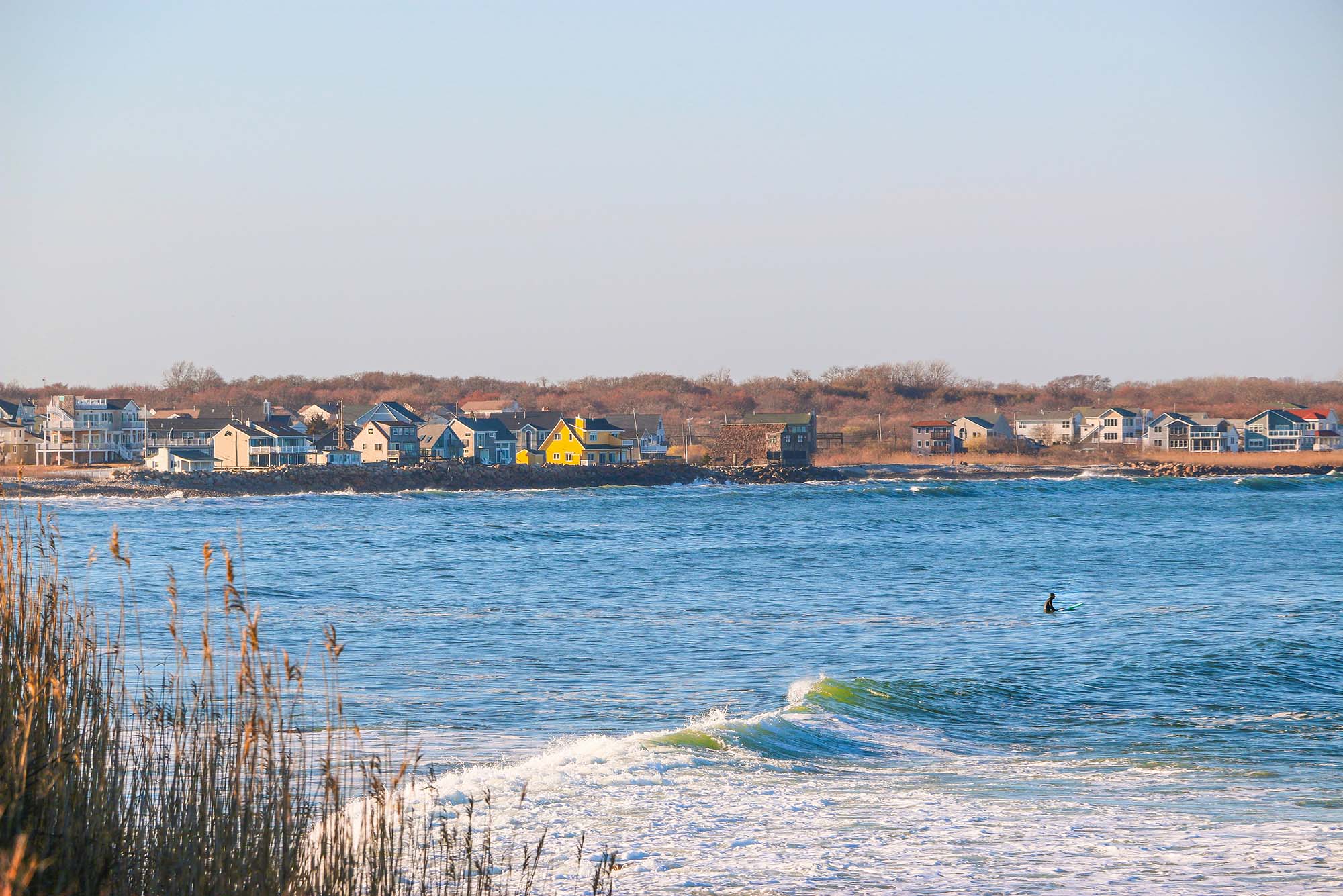2024’s Go-To State for Retirement? Massachusetts (That’s Not a Typo)
BU expert on aging Deborah Carr says climate change, amenities, and politics could account for Bay State’s popularity

Fond memories of childhood Cape Cod vacations may help explain why Massachusetts outpaced every other state for attracting retirees last year. Photo by Unsplash/Anvesh
2024’s Go-To State for Retirement? Massachusetts (That’s Not a Typo)
BU expert on aging Deborah Carr says climate change, amenities, and politics could account for Bay State’s popularity
Well, we didn’t see this coming. Massachusetts—commonwealth of uncommonly high living costs and winters that can drag on for months—was retirement central last year. The state claimed a larger percentage of migrating retirees than any other, nosing out sun-and-beach-dappled Florida, according to online moving aide HireAHelper.
The site’s recently published annual survey, which is based on census data, found that slightly more than a fifth of the almost 266,000 Americans who crossed state lines to retire last year pitched their tents here. We outpaced Florida by just half a percentage point; still, losing the blue ribbon to its costly, colder competitor to the north shocked “even veteran trackers of retiree moves,” the American Association of Retired Persons reports.
No other state came close to the Bay State; for the record, Illinois, Kentucky, and North Carolina rounded out the top five destinations.
“Retirees are a very diverse group,” says Deborah Carr, a BU College of Arts & Sciences Term Distinguished Professor of Sociology. “Some have very little income and few assets and prefer to live in southern states with low costs of living. Yet others have ample savings and pension income and can choose to live wherever they like. Clearly, for many, Massachusetts is that place.”
BU Today asked Carr, director of the University’s Center of Innovation in Social Science and an expert on aging, health, and families, about the sudden popularity of Massachusetts as an older persons’ mecca.
Q&A
with Deborah Carr
BU Today: Are you as surprised as other analysts about Massachusetts’ showing last year?
Carr: It is surprising, because Florida and Arizona are long recognized as retirement magnets due to their warm temperatures, leisure activities, and low taxes. But I have ample anecdotal data—not from my research, but from casual conversations with people I meet!—that Massachusetts is an ideal retirement destination for well-off retirees whose adult children, and young grandchildren, live, work, or go to school in the greater Boston area. These retirees are selling their homes, living closer to their family, and finding appealing rentals and wonderful amenities like arts and culture in Massachusetts.
BU Today: Some analysts speculate that southern states’ recent climate change–related disasters, or perhaps familiarity from past vacations to the Cape or the Berkshires, have fueled the retiree rush here. Do you have a favorite among the possible reasons?
Carr: I wouldn’t make strong conclusions just yet—it’s just one year of data showing the Massachusetts blip. I think there are several reasons for this recent pattern. One is climate change–related disasters and the rising home insurance prices that accompany those disasters in southern states. Another is that Massachusetts is recognized for its world-class healthcare systems, something that becomes increasingly important as older adults develop health concerns. Third, people may have fond recollections of vacations to the Cape, or even cherished memories of attending college in Massachusetts, that make it an ideal retirement destination. Fourth, for some people, living in a solidly blue state is consistent with their political and moral values.
Finally, many older adults prefer to live in more urban settings like Boston or New York, where they do not need to drive. Walkable cities with ample opportunities for social engagement are very appealing to many older adults, especially those who are no longer interested in or comfortable driving a car.
I can see movement to Massachusetts increasing, given rising levels of political polarization in the United States.
BU Today: Might this just be a one-year fluke, given the state’s high cost of living and (for some) offputting winters? Or is there reason to expect more retirees here in future years?
It’s too soon to tell. I can see movement to Massachusetts increasing, given rising levels of political polarization in the United States. Some people may worry for their own well-being (or the well-being of their kids or grandkids) living in a red state with inhospitable policies or cultures. Housing costs in Massachusetts are prohibitive for many older adults, so if the trend continues, I presume it will be largely driven by wealthy older adults. Winters haven’t been too bad in recent years, and with climate change, winters will likely grow slightly warmer. So I doubt the cold temperatures will scare off those who see other benefits to retiring in Massachusetts.
BU Today: If this is indeed a longer-term trend, what might the consequences be—good and bad—that the state should plan on, i.e., more development, even higher living costs, etc.?
Rising numbers of older adults may ultimately mean greater demands for the geriatric healthcare workforce, including long-term care workers, like certified nursing assistants. It is critical that these workers are paid enough to be able to live comfortably in Massachusetts and surrounding areas. The state will also need considerable numbers of healthcare providers to accept Medicare patients, as most older adults use Medicare as their health insurance. Some providers may be discouraged from taking Medicare patients, as its reimbursements tend to be lower than for private insurance patients.
It’s important to also recognize that older adults are an asset—they volunteer at cultural organizations, care for grandchildren, contribute to the economy as consumers, and much more. So, the movement of retirees to Massachusetts can be a real asset.
Comments & Discussion
Boston University moderates comments to facilitate an informed, substantive, civil conversation. Abusive, profane, self-promotional, misleading, incoherent or off-topic comments will be rejected. Moderators are staffed during regular business hours (EST) and can only accept comments written in English. Statistics or facts must include a citation or a link to the citation.